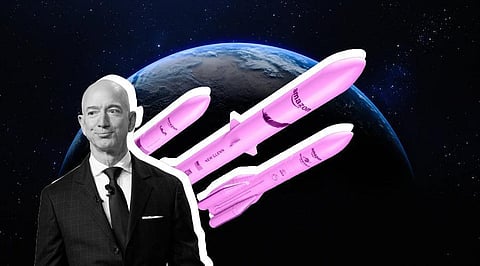

Amazon is set to launch a pair of prototype satellites into space early next year that will eventually form part of its Kuiper low Earth orbit internet constellation – rivaling SpaceX's Starlink. The satellites will launch aboard the first flight of the new United Launch Alliance (ULA) Vulcan rocket, set to take off in the first quarter of 2023, as a secondary payload. The primary payload will be the Peregrine lunar lander built by Astrobotic Technology.
Amazon had hoped to get their test satellites into space this year using a rocket built by ABL Space Systems but the start-up has faced development delays so Amazon switched to ULA, which is a joint venture of Boeing and Lockheed Martin.
During a live interview with the Washington Post, Amazon senior vice president Dave Limp expressed the company's openness to use SpaceX's heavy lift rockets to deploy its Project Kuiper internet satellites. "We are open to talking to SpaceX, you'd be crazy not given their track record here," Limp said.
However, Amazon is not interested in SpaceX's Falcon 9 rockets that are currently lofting the company's Starlink satellites. Amazon's internet satellites are larger than those being deployed by SpaceX, which explains why the company is eyeing SpaceX's Falcon Heavy rocket and its upcoming Starship rocket, the latter of which is still in development.
Limp's statement comes as a surprise considering that Amazon signed deals earlier this year with Arianespace, Blue Origin, and United Launch Alliance to lift its satellites into orbit while leaving out SpaceX from the mix. Both companies are aiming to bring high-speed internet to remote areas across the world by beaming down data signals from low Earth orbit.
SpaceX is building its own internet mega constellation and has already launched more than 3,000 satellites with its Falcon 9 rocket. That puts Elon Musk's company way ahead of its competition, as Amazon has yet to launch its satellite prototypes to orbit. The company recently announced its plans to launch the first two Project Kuiper internet satellites later this year aboard United Launch Alliance's upcoming Vulcan Centaur rocket, which was supposed to launch in 2020 but has suffered multiple delays.
Amazon is seemingly running out of options for rockets, while SpaceX has rockets a plenty, so a future deal between the industry rivals does make sense. A 2020 authorization order from the Federal Communications Commission stipulates that Amazon launch 50% of its 3,236 Project Kuiper satellites by 2026, and the remainder by 2029, or the company will lose its license. "The fact of the matter is that heavy launch capacity is still pretty constrained, and I think it will be for the coming years," Limp said during the interview. Amazon founder Jeff Bezos and Musk have a long-standing rivalry, making this possible arrangement somewhat awkward.
Amazon wants to deploy an internet constellation consisting of thousands of satellites, while SpaceX wants to send upwards of 42,000 satellites to orbit for Starlink. As these companies race to build their satellite constellations in the sky, astronomers on Earth are worried about how these satellites will interfere with observations of the cosmos.
Join our WhatsApp Channel to get the latest news, exclusives and videos on WhatsApp
_____________
Disclaimer: Analytics Insight does not provide financial advice or guidance on cryptocurrencies and stocks. Also note that the cryptocurrencies mentioned/listed on the website could potentially be risky, i.e. designed to induce you to invest financial resources that may be lost forever and not be recoverable once investments are made. This article is provided for informational purposes and does not constitute investment advice. You are responsible for conducting your own research (DYOR) before making any investments. Read more about the financial risks involved here.
